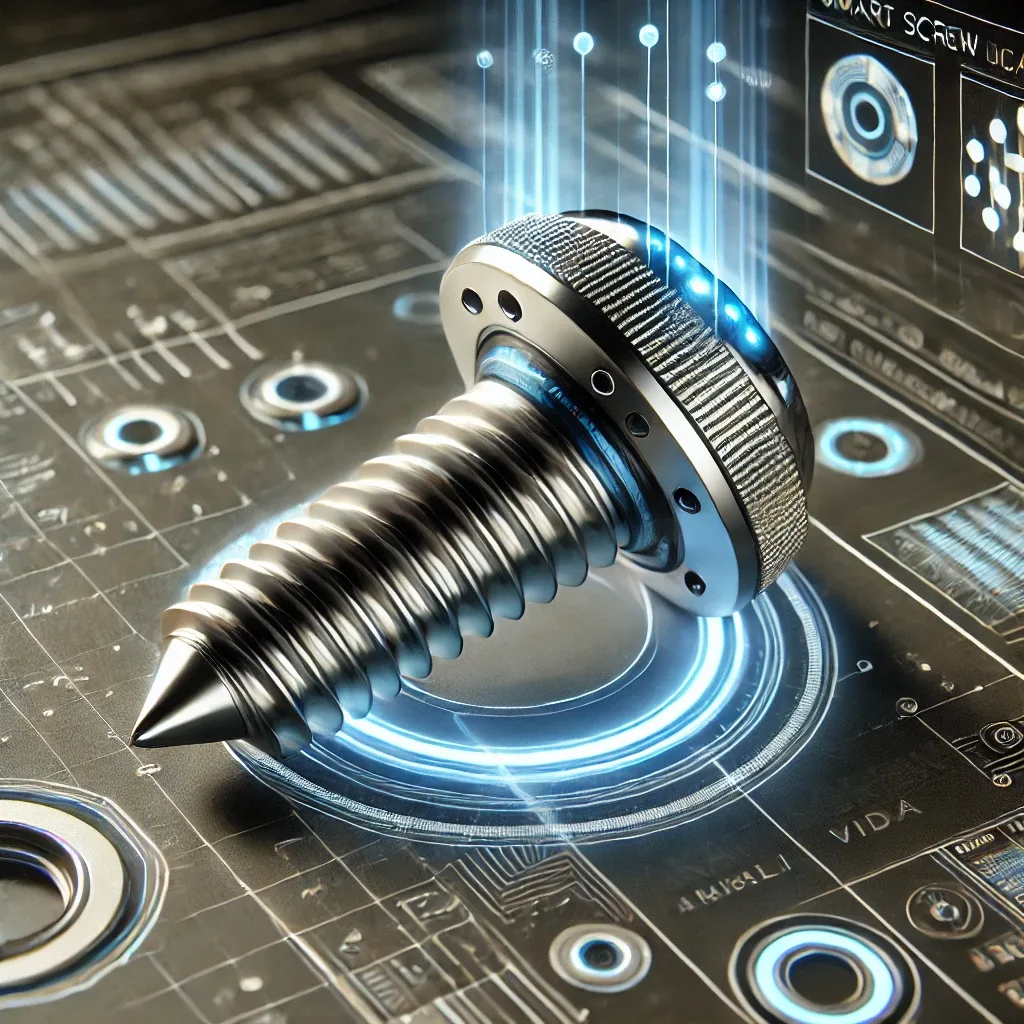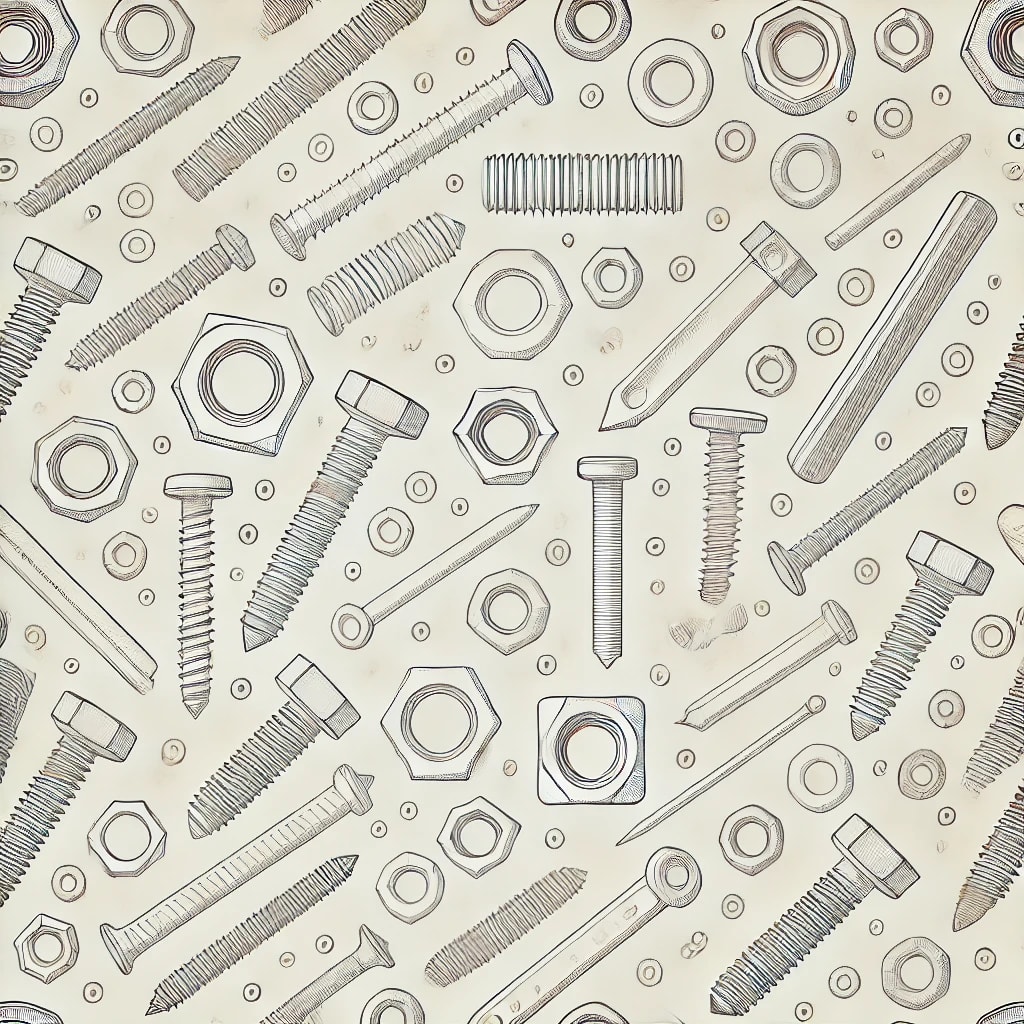
What is a Smart Screw?
Smart screws are specialized types of screws equipped with advanced engineering designs that simplify the assembly process and enhance connection security. Unlike traditional screws, they may feature self-locking mechanisms, resistance to loosening, and, in some cases, even sensors or electronic components. In this article, we will explore in detail the working principles, advantages, and applications of smart screws and how they are revolutionizing the industry.
Working Principle of Smart Screws
Smart screws are advanced fastening elements that differ from traditional screws by being self-tightening, resistant to loosening, and sometimes integrated with sensor technology. These screws are specifically designed for industries requiring high security and durability.
Differences from Traditional Screws
Traditional screws are mechanically fixed at the point where they are tightened and may loosen over time. However, smart screws are designed to maintain their tightness even under vibration, impact, and excessive load. Additionally, certain types of smart screws determine the required torque level during assembly to prevent incorrect tightening.
In recent years, the development of sensor-equipped smart screws has made maintenance processes easier by measuring stress changes at connection points. This feature provides a significant advantage, especially in aerospace, automotive, and heavy industry sectors.
Advantages of Smart Screws
Smart screws offer numerous superior features compared to traditional screws and provide advantages across a wide range of applications, from assembly processes to safety measures. Thanks to advanced engineering designs, these screws bring revolutionary innovations to fastening elements and are especially preferred in industrial manufacturing, automotive, aerospace, and construction industries.
1. Stronger and More Durable Connections
Smart screws provide a stronger grip than traditional screws due to their specially designed thread structures and materials. With self-locking or anti-loosening designs, they offer an excellent solution for structures exposed to constant vibration or carrying heavy loads.
2. Fast and Easy Assembly
Traditional screw assembly processes often require additional equipment, extra tightening steps, or auxiliary fasteners such as nuts. Smart screws, with their special thread structures and self-tapping designs, can be applied directly without the need for pre-drilling. This significantly reduces assembly time and lowers labor costs.
3. Resistance to Loosening
In the machinery and automotive sectors, screw loosening over time can be a significant problem. Smart screws prevent loosening in connections subjected to continuous movement and pressure thanks to their vibration-absorbing properties and special locking mechanisms. This provides a major advantage, especially in safety-critical components.
4. Superior Protection Against Corrosion and Wear
Smart screws are made from stainless steel, titanium, and specially coated materials, ensuring long-lasting performance even in humid and corrosive environments. This feature is particularly crucial in marine, aerospace, and outdoor construction projects.
5. Integration of Sensors and Smart Technology
Advanced smart screws can be equipped with sensors capable of monitoring data such as pressure, torque, and temperature in real-time. This feature allows for remote monitoring and intervention in critical connection points, particularly in aerospace and engineering applications.
6. Eco-Friendly Design
The assembly process of smart screws eliminates the need for extra chemical adhesives or additional fastening elements, reducing waste production. Additionally, their extended lifespan means they require less frequent replacement, providing both a cost advantage and minimizing environmental impact.
Where Are Smart Screws Used?
Smart screws are widely used across various industries due to their advanced features. Compared to traditional screws, they are more durable, reliable, and technologically superior, providing significant advantages in high-precision assembly processes.
1. Automotive and Aerospace Industry
Smart screws serve as critical fastening elements in the automotive and aerospace sectors due to their vibration-resistant structures. Their special locking mechanisms prevent loosening in engines, chassis, and other structural components, making them essential for safety. Additionally, some smart screws used in aerospace applications feature sensor-integrated designs, allowing real-time monitoring of connection points.
2. Construction and Infrastructure Projects
Manufactured from high-strength materials, smart screws are preferred in the construction of buildings, bridges, and other infrastructure projects to ensure durable and long-lasting connections. With self-tightening or anti-loosening properties, they provide a reliable solution for structures exposed to external elements.
3. Electronics and Technology Products
In electronic devices with small and delicate components, smart screws are used to ensure high-precision fastening. They are particularly preferred in smartphones, laptops, and other portable devices, where specialized screws offer maximum strength in tight spaces.
4. Medical and Biotechnology Sector
Smart screws used in medical devices and prosthetics are made from biocompatible materials, ensuring safe interaction with the human body. They provide high durability and long lifespan in critical applications such as orthopedic implants, surgical instruments, and dental prosthetics.
5. Marine and Outdoor Applications
Smart screws used in the marine sector are manufactured with high-corrosion-resistant coatings, making them durable against saltwater and harsh weather conditions. They offer long-term usability in yachts, ship engines, and outdoor structures.
Thanks to their advanced technologies, smart screws are increasingly preferred across multiple industries to create safer, more durable, and more efficient connections. They are rapidly replacing traditional fasteners, especially in applications where safety, durability, and precision are crucial.
The Future of Smart Screws: New Technologies
With advancing technology, fastening elements are undergoing a major transformation, and smart screws are becoming one of the most crucial components of this change. Today’s commonly used mechanical fasteners will be equipped with more advanced materials, sensors, and automation technologies in the future. Thanks to these innovations, screws will not only join two parts together but also become intelligent components that provide information about the connection’s health and durability.
One of the most remarkable features of next-generation smart screws is their integration with sensor technologies. These screws, equipped with micro-sensors, can measure factors such as pressure, temperature, and vibration at connection points, allowing for the early detection of potential loosening or damage. This technology will significantly enhance the safety of critical connections in industries such as aerospace, automotive, and construction, helping to prevent possible accidents. Additionally, smart screws integrated with the Internet of Things (IoT) will enable real-time data transfer, making maintenance processes more efficient.
Advancements in material science will also play a key role in the future of smart screws. In the coming years, screws made from lightweight yet highly durable alloys will become more resistant to wear and corrosion. Furthermore, special self-tightening and anti-loosening designs will allow for long-lasting connections without the need for human intervention. All these developments indicate that smart screws will remain one of the most reliable fastening elements not only today but also in the future.
Key Considerations When Choosing a Smart Screw
Smart screws offer more reliable, durable, and technological solutions compared to traditional screws. However, selecting the right smart screw requires careful consideration of several critical factors. First, the characteristics of the environment in which the screw will be used must be taken into account. Screws made from stainless steel, titanium, or special alloys are more resistant to wear and corrosion. In environments exposed to moisture or chemicals, screws with extra protective coatings should be preferred. Additionally, in structures carrying heavy loads, high-strength smart screws with enhanced durability are essential.
Another important criterion is the technological features offered by the smart screw. IoT (Internet of Things)-enabled screws monitor the tightness of the connection, allowing maintenance when necessary. Sensor-integrated screws enhance connection security by measuring pressure, temperature, or vibration. In critical industries such as manufacturing, automotive, and aerospace, continuous monitoring and optimization of connections provide significant advantages. Choosing the most suitable smart screw model for the application not only increases assembly safety but also leads to long-term cost savings.
Common Issues and Solutions in Smart Screw Usage
1. Incorrect Screw Selection
Smart screws are specifically designed for different materials and applications. Choosing the wrong screw can result in a weak connection and lead to loosening over time. As a solution, a smart screw made from a material suitable for the environment and load capacity should be selected, and its technical specifications should be thoroughly examined.
2. Insufficient Tightening Torque
Over-tightening or under-tightening screws can compromise the security of the connection. Screws tightened with insufficient torque may loosen over time, causing the connection to fail. As a solution, the manufacturer's recommended torque values should be followed, and the tightening process should be carried out using precision measuring devices such as a torque wrench.
3. Corrosion and Wear Issues
Smart screws used in outdoor or chemical environments may wear out or rust over time. Corrosion can weaken connections, creating serious safety risks. To prevent this issue, stainless steel or specially coated smart screws should be used, and periodic maintenance should be performed.
4. Sensor or Electronic Component Failures
Some smart screws are equipped with electronic components such as vibration sensors or IoT connectivity. These components may fail after prolonged use. As a solution, screws should be regularly inspected, software updates should be applied, and support from the manufacturer should be sought when necessary.
5. Loosening and Connection Issues
Loosening of screws in vibrating environments is a common problem. This issue can cause significant complications, especially in the automotive, machinery, and construction industries. As a solution, self-locking smart screws or specialized tightening techniques should be used.
To read our article on screw types and their applications: Screw Types and Applications
To learn about the advantages of smart screws and discover the best solutions for your projects: contact us
